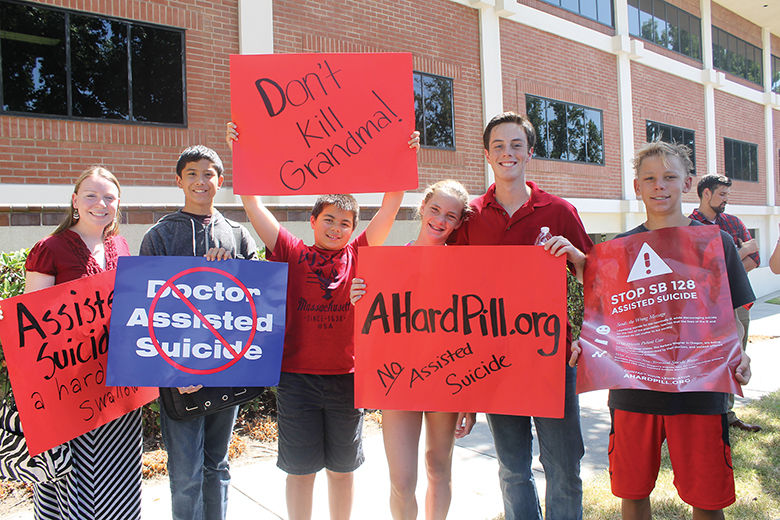PASADENA — Joseph Domingo is only 11, but he knows the lethal consequences if California legislators pass the proposed assisted suicide bill, AB2X 15, successor of SB 128, the “End of Life Option Act.”
On Aug. 28, supporters and opponents of assisted suicide rallied outside the offices of Chris Holden (D-Pasadena), California State Assembly leader, whom both parties consider a key member in the legislative process. Similar measures to legalize assisted suicide have failed in Connecticut, Maryland and Nevada this year.
“Don’t kill my Grandma,” read the banner carried by Joseph, who was accompanied by his mother, kathleen-domingo, associate director of the archdiocesan Office of Life, Justice and Peace.
“I think it will be easier and cheaper for people to kill themselves,” Joseph said. “I don’t think my grandmother wants to commit suicide.”
SB 128 was withdrawn in July by Sen. Bill Monning (D-Carmel) in the Assembly Health Committee when proponents feared they didn’t have the votes needed to advance the measure.
However, Assemblywoman Susan Talamantes Eggman (D-Stockton) introduced a new version in a special session called by Gov. Jerry Brown, including AB2X 15 in health financing.
AB2X 15 would allow mentally capable, terminally-ill adults to ask doctors for medication to shorten their dying process.
In Oregon, assisted suicide is legal. In 2009, 95 prescriptions were written for lethal medications, resulting in 59 deaths. In the remaining cases, the medication was not ingested because people considered they were not ready to die even though they had a terminal illness.
About 80 percent of the patients had malignant cancer and the most commonly ingested lethal medication was secobarbital (85 percent of cases). About 78 percent of the patients were 55-84 years of age.
“Many of the reasons why they want to offer assisted suicide is because they believe that there are people whose lives are not important, and for those who can’t afford proper treatment,” said Kathleen Domingo. “This is not about compassion and choices. This issue is about doses of lethal drugs to take one self’s life for $50.”
Gov. Brown called on the Assembly to a special session in June for various purposes, including to “consider and act on legislation needed to reduce the cost of providing health services.”
Brown proposed that the legislature enact permanent and sustainable funding to provide at least $1.1 billion annually to stabilize the state’s general fund for Medi-Cal, sufficient funding to continue the restoration of the seven percent of in-home supportive services hours and funding for additional rate increases for providers of Medi-Cal and developmental disability services.
“We support those items,” said Teresa Favuzzi, executive director of Californians Against Assisted Suicide. “However, it is wholly inappropriate and troubling that AB2X 15 authors have included assisted suicide in this special session health care funding conversation.”
The dilemma for many is that proponents of AB2X 15 are linking the bill with health care financing. At the same time it would be the solution for advocates of Compassion and Choices to legalize assisted suicide in California.
“It is urgent to pass the law,” said Patricia Portillo, spokeswoman for Compassion and Choices. “People are dying and they cannot wait another legislative session.”
Questioned about the savings and economic impact each death of those who choose suicide would have on the state, she replied: “It’s not a subject that I know.”
Dangerous implications
Archbishop José H. Gomez strongly opposed assisted suicide in an open letter to Rob Bonta, chair of the state Assembly Health Committee.
On behalf of 4.2 million Catholics in Los Angeles, the archbishop requested Bonta reject SB 128. The legislation has dangerous implications for California, especially for the poor and most vulnerable, he said.
Archbishop Gomez wrote that he has no doubt about the well-meaning of the sponsors of the legislation and understands the desire to return compassion and personal freedom to the healthcare business that “in recent years has become more and more depersonalized and driven by imperatives of money and technology.”
He understands the legitimate concerns that many have for those with terminal diseases and chronic pain, especially at the end of life.
“They are afraid of being forced to suffer and they are afraid of being unable to control their pain or illnesses,” he said. “They are also worried about becoming dependent or dying alone in a hospital, attached to all sorts of medical devices.”
Such concerns are natural and justified, he said.
“The answer to fear and a broken system is to fix the system and address the fears,” he explained. “It is not about killing the person who is afraid and suffering.”
The Death with Dignity Act was enacted for the first time in the United States in 1997. Since then, a total of 1,327 people have requested deadly drugs and 859 who were suffering from terminal illnesses committed suicide.
“It’s not suicide,” contested Ignacio Castuera, a supporter of ABX2 15 and pastor of the United Methodist Church of Pomona. “God gave us free will to decide what is good and bad, and between God and us, we have the special right to decide how to die when a person is hopeless.”
The argument, however, did not convince the Joseph Domingo.
“I would never accept if my Grandma wants to commit suicide,” the boy said. “Your life belongs to God, not the doctors.”

